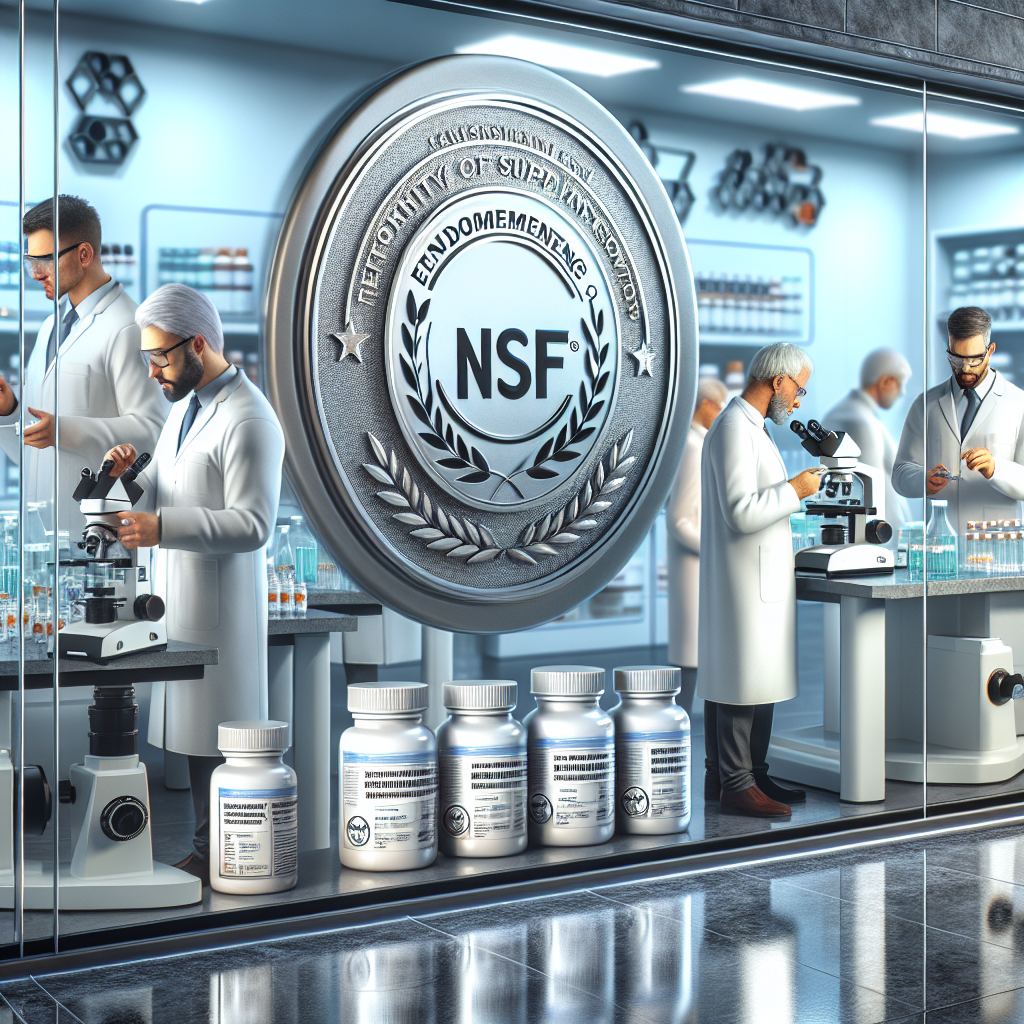Discover why elite athletes and health-conscious consumers are increasingly turning to NSF certified creatine for guaranteed purity, potency, and safety in their sports nutrition regimen.
In the competitive world of sports supplements, quality and safety are non-negotiable. Athletes at all levels are constantly seeking products that deliver on their promises without compromising health or competitive eligibility. Enter NSF Certified creatine – a revolutionary approach to one of the most well-researched performance supplements on the market today. This certification represents far more than just another label on a bottle; it’s a comprehensive guarantee that the product inside meets the highest standards for purity, potency, and safety.
NSF certification serves as the gold standard in quality assurance for dietary supplements, providing athletes and health-conscious consumers with peace of mind in an industry often criticized for its lack of regulation. When a creatine product bears the NSF mark, it signifies that the supplement has undergone rigorous testing and evaluation by an independent organization committed to protecting public health. For athletes who stake their careers on the supplements they take, this level of verification isn’t just desirable—it’s essential.
The Critical Importance of Quality in Dietary Supplements
The dietary supplement industry has expanded dramatically over recent years, with countless products making bold claims about performance enhancement and recovery benefits. However, this growth has been accompanied by serious concerns about product quality and safety. A 2018 study published in the Journal of the International Society of Sports Nutrition found that nearly 15% of supplements tested contained substances not listed on their labels, many of which were banned by major sports organizations.
This reality makes the role of third-party certification bodies like NSF International increasingly crucial. Athletes and forward-thinking manufacturers alike recognize that without proper verification, the risks associated with supplement use can far outweigh the potential benefits.
The NSF Certified for Sport program addresses these concerns head-on by implementing a comprehensive evaluation process designed specifically for products intended for athletic use. This program goes beyond basic quality testing to ensure that supplements are free from more than 280 substances banned by major athletic organizations. According to NSF International, products bearing the Certified for Sport mark undergo ongoing monitoring to verify that they continue to meet these stringent requirements over time.
“The NSF Certified for Sport program provides the only independent third-party certification that tests specifically for substances banned in sport,” explains John Travis, Senior Research Scientist at NSF International. “For athletes subject to drug testing, this certification dramatically reduces the risk of a positive test due to supplement contamination.”
Many professional sports leagues, including the NFL, MLB, and NHL, recognize the value of this certification and specifically recommend NSF Certified for Sport products to their athletes. This endorsement speaks volumes about the program’s credibility and effectiveness in ensuring supplement safety and quality.
Understanding Creatine: Function, Benefits, and Quality Considerations
Creatine has earned its place as one of the most thoroughly researched and widely used sports supplements globally. At its core, creatine is a naturally occurring compound found in small amounts in certain foods and synthesized by the body primarily in the liver, kidneys, and pancreas. Its primary function is to help recycle adenosine triphosphate (ATP), the body’s primary energy currency, particularly during high-intensity, short-duration activities.
The benefits of creatine supplementation are well-documented through decades of scientific research. Athletes who incorporate creatine into their regimen typically experience:
- Enhanced power output and strength during high-intensity exercise
- Improved muscle recovery between training sessions
- Increased lean muscle mass when combined with resistance training
- Better muscular endurance during repeated bouts of intense activity
- Potential cognitive benefits, including improved memory and mental processing
Among the various forms of creatine available, creatine monohydrate stands out as the most extensively studied and consistently effective option. This form has demonstrated remarkable stability and bioavailability, making it the preferred choice for most athletes and sports nutrition experts.
However, not all creatine monohydrate is created equal. The sourcing and manufacturing processes significantly impact the final product’s purity and effectiveness. High-purity creatine like Creapure®, produced in Germany under stringent quality controls, maintains a documented purity level of ≥99.9%. This exceptional standard means athletes receive more actual creatine monohydrate per serving compared to products with lower purity levels.
“The difference between standard creatine and high-purity options like Creapure isn’t just marketing—it’s measurable in both lab testing and performance outcomes,” notes Dr. Susan Thompson, sports nutrition researcher. “When athletes invest in their bodies with supplements, the purity of those ingredients directly impacts results.”
The Rigorous Standards Behind NSF Certification
The NSF certification process represents the pinnacle of supplement verification, ensuring products meet the highest standards for purity, potency and safety.
The NSF certification process represents one of the most comprehensive evaluation systems in the supplement industry. For creatine products seeking this certification, the journey involves multiple phases of testing and verification against the NSF/ANSI 173 standard—the only American National Standard for dietary supplements.
The certification process includes:
Comprehensive Product Testing: Each product undergoes testing to verify that what’s on the label matches what’s in the bottle. For nsf certified creatine, this means confirming the exact amount of creatine per serving and ensuring no unlisted ingredients are present.
Contaminant Screening: Products are tested for harmful contaminants including heavy metals, pesticides, and microbial contaminants that could pose health risks.
Manufacturing Facility Audits: NSF conducts thorough inspections of manufacturing facilities to ensure they follow Good Manufacturing Practices (GMPs) as required by the FDA.
Ongoing Monitoring: Certified products undergo periodic retesting and facility reinspection to maintain their certification status.
For products seeking the additional NSF Certified for Sport designation, the process includes further testing for more than 280 substances prohibited in sport. This list encompasses stimulants, narcotics, steroids, diuretics, beta-2 agonists, and other compounds banned by major athletic organizations worldwide.
The thoroughness of this process creates a significant barrier to entry, which is precisely why nsf certified creatine is relatively rare in the marketplace. Only manufacturers truly committed to quality and transparency are willing to subject their products to such intensive scrutiny.
“The NSF certification process requires a substantial investment from manufacturers,” explains James Chen, quality assurance director at a leading supplement company. “But for those of us committed to producing genuinely premium products, it’s an investment worth making. NSF certification isn’t just another marketing tool—it’s a fundamental commitment to consumer safety and product integrity.”
Consumer Benefits: Why Athletes Choose NSF Certified Creatine
For athletes at all levels, the decision to use NSF certified creatine provides multiple advantages that extend far beyond basic supplement benefits.
Guaranteed Purity and Potency
With NSF certified creatine, athletes can trust that they’re receiving exactly what the label claims—pure creatine without fillers, contaminants, or undeclared ingredients. This certification ensures that each serving delivers the full intended dose of creatine, maximizing the product’s effectiveness for performance enhancement and recovery.
Reduced Risk of Contamination
Perhaps most crucially for competitive athletes, NSF certified creatine virtually eliminates the risk of consuming banned substances that could lead to a failed drug test. This protection is invaluable for professionals whose careers depend on maintaining clean testing records.
Mark Johnson, a competitive powerlifter, shares his experience: “After a teammate tested positive from a contaminated pre-workout, I switched exclusively to NSF certified creatine and other NSF Certified for Sport supplements. The peace of mind alone is worth the premium price—knowing that what I’m putting in my body won’t compromise my eligibility is priceless.”
Transparent Manufacturing
NSF certification requires complete transparency throughout the manufacturing process. For consumers, this means access to more detailed information about how their supplements are produced, including sourcing of raw materials and quality control measures.
Support for Informed Decision-Making
By choosing NSF certified creatine, athletes demonstrate their commitment to making educated, responsible choices about their supplementation protocols. This approach aligns with a holistic view of athletic development that prioritizes not just performance, but long-term health and wellbeing.
The Future of Quality in Sports Nutrition
As awareness of supplement quality issues continues to grow, the demand for NSF certified creatine and other third-party verified products is expected to increase substantially. Forward-thinking manufacturers are recognizing that certification is no longer just a competitive advantage—it’s becoming a market expectation.
The trend toward higher standards in sports nutrition reflects a broader shift in consumer priorities across the health and wellness landscape. Today’s athletes are more informed than ever before, with access to research and resources that help them make evidence-based decisions about their supplementation strategies.
This evolution represents a positive development for the industry as a whole. As more companies commit to rigorous quality standards, the overall safety and effectiveness of sports supplements will continue to improve, benefiting athletes at all levels.
Conclusion: Making Quality the Priority
In the quest for athletic excellence, every advantage matters—but not at the expense of health or competitive integrity. NSF certified creatine represents the perfect intersection of performance enhancement and quality assurance, providing athletes with a powerful tool they can trust completely.
When selecting supplements like creatine, certification should be considered not as an optional luxury but as an essential component of the decision-making process. The NSF mark serves as verification that a product has been thoroughly evaluated by an independent organization with no vested interest in the product’s success.
This commitment to quality, transparency, and consumer empowerment reflects the core philosophy that should guide all nutritional choices. By prioritizing NSF certified creatine and other verified supplements, athletes take control of their health and performance in a meaningful way.
The future of sports nutrition lies in this direction—toward greater accountability, improved standards, and unwavering dedication to product integrity. For manufacturers and consumers alike, embracing these values isn’t just good practice; it’s the only sustainable path forward in an industry where trust is paramount and excellence is the ultimate goal.


